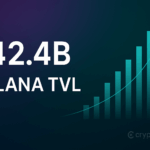Key Highlights
- The Ethereum Foundation has officially formed a new Privacy Cluster, composed of 47 leading researchers, engineers, and cryptographers, to accelerate privacy feature development for Ethereum’s Layer-1 network.
- The cluster is coordinated by Igor Barinov and builds on prior efforts by the Privacy Stewards for Ethereum (PSE) team.
- Its mandate spans multiple core privacy initiatives — including Private Reads & Writes, Private Proving, zkID / Private Identities, Privacy UX, and institutional coordination via a Privacy Task Force.
- The Foundation underscores that privacy is fundamental to Ethereum’s long-term trust model, especially as surveillance, regulatory scrutiny, and metadata risks intensify.
What Is the Privacy Cluster & What It Will Do
The Privacy Cluster is essentially a formalized, cross-ecosystem team that consolidates and scales up privacy efforts previously scatteredJ or experimental. Some of its planned workstreams include:
- Private Reads & Writes: Enabling on-chain actions (payments, governance, interaction) without leaking metadata or relinquishing confidentiality.
- Private Proving / Zero-Knowledge Infrastructure: Advancing proof systems that allow verification (identity, credentials, asset ownership) without revealing extraneous data.
- Private Identities / zkID: Building selective disclosure identity systems that let users reveal what is necessary — not everything.
- Privacy UX / Experience: Improving usability and accessibility so privacy features feel native rather than optional.
- Institutional Privacy Task Force (IPTF): Bridging the gap between cryptographic/privacy innovation and real-world regulatory, compliance, and institutional4 requirements.
- Kohaku Wallet / SDK: A privacy-preserving wallet and open SDK to help developers and users integrate strong cryptography more easily.
The cluster will closely coordinate with existing privacy R&D efforts, especially the PSE team, which will continue focusing on early-stage cryptographic exploration.
Why This Step Matters
- Privacy as a First-Class Property
Ethereum has long grappled with the tension between transparency (a public ledger) and user confidentiality. By formally elevating privacy work into a dedicated cluster, the Foundation is signaling that they intend confidentiality to be baked into the protocol stack — not just layered solutions. - Institutional & Regulatory Confidence
For institutions, privacy is often a prereq before on-chain operations (e.g. for sensitive financial or identity data). The IPTF track helps ensure that privacy work considers regulatory constraints from the outset, potentially reducing friction. - Ecosystem Coordination
Many privacy-related projects exist across Ethereum and adjacent ecosystems (mixers, zk tools, identity protocols). The cluster offers a coordinating body to reduce fragmentation, avoid duplication, and provide standards. - Competitive Edge & Adoption
As privacy becomes more valued globally — especially under increasing surveillance, data regulation, and AI monitoring — Ethereum’s ability to offer native privacy could be a differentiator in DeFi, DAOs, identity, and next-gen apps.
Challenges & Potential Headwinds
- Regulatory scrutiny & compliance risk
Privacy-enhancing features often attract regulatory attention (e.g. AML / KYC concerns). How the cluster designs tools to be privacy-aware yet compliance-friendly will be critical. - Performance & scalability trade-offs
Privacy (e.g. zero-knowledge proofs, private reads) often carries computational or storage overheads. Integrating privacy without degrading performance is nontrivial. - Adoption & tooling
Tools built must be user-friendly, well-integrated, and widely adopted; privacy that is cumbersome or hidden will see low usage. - Interoperability & standardization
Coordinating with L2s, cross-chain bridges, and privacy projects elsewhere is essential to build coherent, usable systems.
What to Watch Going Forward
- Release of roadmaps & technical specifications by the Privacy Cluster (e.g. announcements of pilot features)
- Open-source contributions from the cluster (wallets, SDKs, protocols)
- Partnerships with privacy tool projects, DeFi apps, and identity initiatives
- Regulatory engagement by the IPTF track — how the cluster addresses compliance, auditability, and institutional use cases
- User adoption metrics — e.g. how many apps begin integrating private features, usage within testnets / Canary networks
Bottom Line
With the launch of its Privacy Cluster, the Ethereum Foundation is signaling a new phase in the network’s evolution — one where privacy is not optional but foundational. Bringing together top cryptographers and engineers, coordinating institutional alignment, and building integrated7 privacy primitives, the cluster’s success could redefine how Ethereum handles data confidentiality, identity, and trust in the years ahead.
VX9F1Q2R












